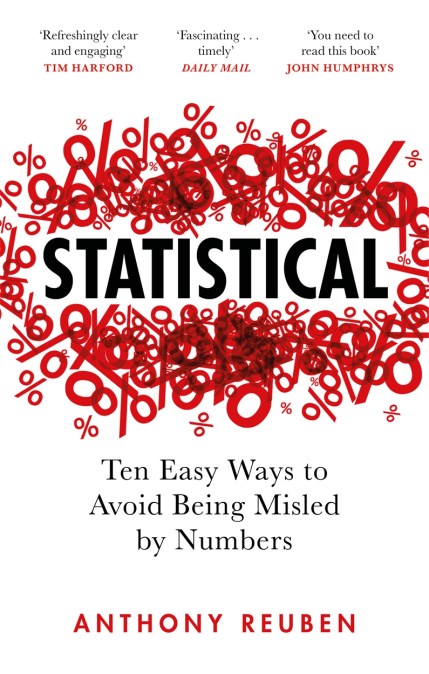Statistical
On sale
2nd May 2019
Price: £8.99
‘Refreshingly clear and engaging’ Tim Harford
‘Delightful . . . full of unique insights’ Prof Sir David Spiegelhalter
There’s no getting away from statistics. We encounter them every day. We are all users of statistics whether we like it or not.
Do missed appointments really cost the NHS £1bn per year?
What’s the difference between the mean gender pay gap and the median gender pay gap?
How can we work out if a claim that we use 42 billion single-use plastic straws per year in the UK is accurate?
What did the Vote Leave campaign’s £350m bus really mean?
How can we tell if the headline ‘Public pensions cost you £4,000 a year’ is correct?
Does snow really cost the UK economy £1bn per day?
But how do we distinguish statistical fact from fiction? What can we do to decide whether a number, claim or news story is accurate? Without an understanding of data, we cannot truly understand what is going on in the world around us.
Written by Anthony Reuben, the BBC’s first head of statistics, Statistical is an accessible and empowering guide to challenging the numbers all around us.
‘Delightful . . . full of unique insights’ Prof Sir David Spiegelhalter
There’s no getting away from statistics. We encounter them every day. We are all users of statistics whether we like it or not.
Do missed appointments really cost the NHS £1bn per year?
What’s the difference between the mean gender pay gap and the median gender pay gap?
How can we work out if a claim that we use 42 billion single-use plastic straws per year in the UK is accurate?
What did the Vote Leave campaign’s £350m bus really mean?
How can we tell if the headline ‘Public pensions cost you £4,000 a year’ is correct?
Does snow really cost the UK economy £1bn per day?
But how do we distinguish statistical fact from fiction? What can we do to decide whether a number, claim or news story is accurate? Without an understanding of data, we cannot truly understand what is going on in the world around us.
Written by Anthony Reuben, the BBC’s first head of statistics, Statistical is an accessible and empowering guide to challenging the numbers all around us.
Newsletter Signup
By clicking ‘Sign Up,’ I acknowledge that I have read and agree to Hachette Book Group’s Privacy Policy and Terms of Use
Reviews
Fascinating . . . timely . . . a lovely humorous undercurrent to it all
Statistics can clarify or confuse. That's why you need to read this book
A refreshingly clear and engaging guide to the statistical claims all around us
Having spent his journalistic career working in a newsroom, being inundated with press releases full with dodgy statistics, Reuben has learned all the ways in which numbers can tell a misleading story. In this delightful book, full of unique insights from personal experience, he warns us of the phrases to look out for, and all the questions to ask about shabby surveys and dubious economic forecasts - there's also a great chapter on how to interpret big numbers. And he advises that we all ask the big question - is this number reasonably likely to be true?

